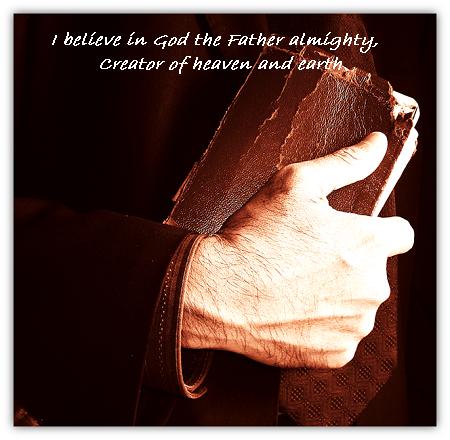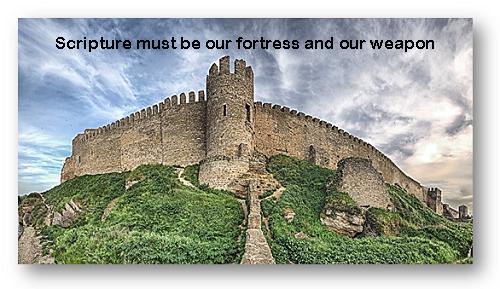The Authority and Special Character of the Bible
The Authority and Special Character of the Bible

The historic Confessions of the church are a good place to begin when we talk about the authority and the special character of the Bible.
We, as Christians, are not living in an historical vacuum, but are part of a long tradition of church history. To say this in an Augustinian way, we are citizens of the City of God, heading for a glorious climax of history when the Lord Jesus appears at His Second Coming. In the meantime we are engaged in the all-absorbing spiritual battle against Satan and his hosts, and against the rebellious City of man, called to “take the helmet of salvation, and the sword of the Spirit, which is the word of God” (the rema theou) (Ephesians 6:17). And we do this as a Confessing Church, united spiritually to Peter when he confessed (spoke publically) that Jesus “is the Christ, the Son of the living God!” (Matthew 16:17).
The Early Confessions⤒🔗
As Reformed Churches in the world, we have early Confessions, dating from the early church. In the Belgic Confession of 1561 we say that we “willingly receive the three creeds, of the Apostles, of Nicea, and of Athanasius.” To be more specific, these are creeds recognized officially by the historic Western church. The Eastern Orthodox churches recognize and generally admire the Apostles’ Creed and the Athanasian Creed, but of these three they hold officially only to the Nicene Creed.
While the Apostles’ Creed does not mention Scripture directly, every statement clearly comes from Scripture: “I believe in God the Father almighty, Creator of heaven and earth.” Or in the Latin original: “Credo in Deum Patrem omnipotentem.” This is an echo of many Scripture verses. Think of the expression “God the Father.” In Isaiah 63:16 we read: “You, O LORD, are our Father” (NKJV) (Hebrew: “attah YHWH abinu”). Think of the next phrase: “Creator of heaven and earth.” In Latin: “Creator(em) coeli et terrae.” This is another echo of many texts in the Bible, starting with the very first: “In the beginning God created the heavens and the earth” (Genesis 1:1). And so on throughout this creed. The Apostles’ Creed is totally derived from the revelation in Scripture.
The Nicene Creed speaks more explicitly about Scripture. We read there, “And we believe in the Holy Spirit ... who spoke through the prophets.” The original Greek has here: “to lalesan dia toon profeetoon”. We can see the Nicene Creed as an elaboration of shorter, baptismal creeds, similar to the Apostles’ Creed. Here it is said explicitly that the Holy Spirit “spoke through the prophets.” And by this is meant not only the prophets of the Old Testament, like Isaiah, but all those who as prophets were used by God to speak His words, which were eventually written down as Holy Scripture. The Bible, according to the Nicene Creed, has been spoken by God’s prophets, is now written down, and still is God the Holy Spirit’s Word to the world.
The Athanasian Creed, like the Apostles’ Creed, does not refer to Scripture directly. But every statement is thoroughly based on what Scripture says, about God, and about the Lord Jesus Christ. It is a confession of “the catholic faith,” in Latin, the “fides catholica.” That does not mean the Roman Catholic church, but means the church spread throughout the whole world, united in faith in the Trinity and in the divinity and humanity of Christ. Here too, Scripture is the source of what is confessed. Although the word “trinity” (Latin “Trinitas”), is not found in the Bible, the concept of the Trinity, Father, Son, and Holy Spirit is very much present. Think of John 1:1: “In the beginning was the Word, and the Word was with God, and the Word was God”: “en archee een ho logos, kai ho logos een pros ton theon, kai theos een ho logos”. This proves the full Godhood of Jesus: the Word was (and remains!) God. Other texts in the Bible demonstrate the full divinity of the Holy Spirit. So the Athanasian Creed, in confessing faith in God as Trinity, is doing nothing other than putting in clear words what the Bible reveals about God in Himself.

The Belgic Confession←⤒🔗
When we look at the three Confessions of the Reformed Churches in The Netherlands, we discover that the Articles on Scripture are much more elaborate. In particular, the Belgic Confession, is the most extensive in confessing the authority and purpose of the Bible.
The Belgic Confession does this in Articles 2 to 7 (I use the English version of the Canadian Reformed Churches):
Article 2 says that God has revealed Himself 'by the creation, preservation and government of the universe.” In the original French of Guido de Bres, the French-speaking Belgian author: “Par la creation, conservation, et gouvernement du monde universel.” “Second, He makes Himself more clearly and fully known to us by His holy and divine Word as far as is necessary for us in this life, to His glory and our salvation.' («Secondement, il se donne à cognoistre à nous plus manifestement par sa saincte et divine parole; voire autant pleinement, qu’il nous est de besoin en ceste vie pour sa gloire, et le salut des siens.»)
Here we see that God’s revelation in nature is complemented and increased, as far as content, by the written Word, the Bible, which is given to save us, to the glory of God. Here we see the special character of the Bible. It is not a book with a lot of interesting information, like a Guiness Book of Records, but a book with a saving purpose in combination with giving glory to God.
In the rest of the articles of the Belgic Confession we confess the following about the Bible:
Art. 3: It is the Word of God, committed to writing by God Himself through his human servants. As such it is “holy and divine Scriptures.” («Escritures Sainctes et divines»).
Art. 4: A list of the canonical books, that is those books which we receive as inspired by the Holy Spirit (excluding the Apocrypha).
Art. 5: “The authority of Holy Scripture.” Here it is appropriate to cite the entire text: “We receive all these books, and these only, as holy and canonical, for the regulation, foundation, and confirmation of our faith. We believe without any doubt all things contained in them (“et indubitable (nous) croyons toutes choses qui sont continues en iceux”), not so much because the church receives and approves them as such, but especially because the Holy Spirit witnesses in our hearts that they are from God, and also because they contain the evidence of this in themselves; for even the blind are able to perceive that the things foretold in them are being fulfilled.”
Art. 6: “The Difference between the Canonical and Apocryphal Books.” Here it is said that we can learn from the apocryphal books, but they do not have the same “power and authority” (“force et virtu”) as the canonical books.
Art. 7, “The Sufficiency of Holy Scripture.” “We believe that the Holy Scripture fully contains the will of God and that all that man must believe in order to be saved (“doit croire pour estre sauvé”) is sufficiently taught (“suffisament enseigné”) therein ... It is therefore unlawful for anyone, even for an apostle, to teach otherwise than we are now taught in Holy Scripture... it is evident that the doctrine thereof is most perfect and complete in all respects” (“... la doctrine est tresparfaitte et accomplie en toutes sortes”) ... “We may not consider any writings of men, however holy these men may have been, of equal value with the divine Scriptures; nor ought we to consider custom, or the great multitude, or antiquity, or succession of times and persons, or councils, decrees or statutes, as of equal value with the truth of God, since the truth is above all; for all men are of themselves liars, and only a breath (Ps. 62:9). We therefore reject with all our heart whatever does not agree with this infallible rule (“ceste reigle infallible”), as the apostles have taught us: Test the spirits to see whether they are from God (1 John 4:1). Likewise: If any one comes to you and does not bring this teaching, do not take him into your house or welcome him (2 John 1:10).”

Here in these articles we see the Belgic Confession confessing the faith of the Reformed Churches in the unique authority of the inspired, infallible (in the sense of always totally true and reliable!) Scriptures, combined with affirming their soteriological purpose: “to His glory and for our salvation” (“le salut des siens” Art. 2). Although the Bible speaks authoritatively on all that it speaks, including minute historical details and geographical matters, we see that all those details ultimately are related to the saving purpose of Scripture: to bring us to a saving faith in the Lord Jesus, through the power of the Holy Spirit, to the glory of God, Father, Son, and Spirit. This remains the “scopus,” the aim of the Bible. The Scripture doesn’t want to satisfy our curiosity, it wants to save us from an eternal hell, and glorify God in the process! If we hold these two matters together, the authority and the purpose of the Bible, then we are confessing the Word as the church always has wanted us to confess!
The Westminster Confession←⤒🔗
It is striking that all orthodox Protestant Confessions since the Reformation, Lutheran, Reformed, and including the Reformed Baptist Confessions, have uniformly echoed these convictions expressed in the Belgic Confession. That is certainly true of the Westminster Confession (I use the version used by the Orthodox Presbyterian Church in the U.S.A.):
Chapter 1: Of the Holy Scripture←↰⤒🔗
- Although the light of nature, and the works of creation and providence do so far manifest the goodness, wisdom, and power of God, as to leave men un-excusable; yet are they not sufficient to give that knowledge of God, and of his will, which is necessary unto salvation. Therefore it pleased the Lord, at sundry times, and in divers manners, to reveal himself, and to declare that his will unto his church; and afterwards, for the better preserving and propagating of the truth, and for the more sure establishment and comfort of the church against the corruption of the flesh, and the malice of Satan and of the world, to commit the same wholly unto writing: which maketh the Holy Scripture to be most necessary; those former ways of God’s revealing his will unto his people being now ceased.
- Under the name of Holy Scripture, or the Word of God written, are now contained all the books of the Old and New Testaments, which are these: (Here follows the list of the canonical books) All which are given by inspiration of God to be the rule of faith and life.
- The authority of the Holy Scripture, for which it ought to be believed, and obeyed, dependeth not upon the testimony of any man, or church; but wholly upon God (who is truth itself) the author thereof: and therefore it is to be received, because it is the Word of God.
- We may be moved and induced by the testimony of the church to a high and reverent esteem of the Holy Scripture. And the heavenliness of the matter, the efficacy of the doctrine, the majesty of the style, the consent of all the parts, the scope of the whole (which is, to give all glory to God), the full discovery it makes of the only way of man’s salvation, the many other incomparable excellencies, and the entire perfection thereof, are arguments whereby it doth abundantly evidence itself to be the Word of God: yet notwithstanding, our full persuasion and assurance of the infallible truth and divine authority thereof, is from the inward work of the Holy Spirit bearing witness by and with the Word in our hearts.
- The whole counsel of God concerning all things necessary for his own glory, man’s salvation, faith and life, is either expressly set down in Scripture, or by good and necessary consequence may be deduced from Scripture: unto which nothing at any time is to be added, whether by new revelations of the Spirit, or traditions of men. Nevertheless, we acknowledge the inward illumination of the Spirit of God to be necessary for the saving understanding of such things as are revealed in the Word...
- The Old Testament in Hebrew (which was the native language of the people of God of old), and the New Testament in Greek (which, at the time of the writing of it, was most generally known to the nations), being immediately inspired by God, and, by his singular care and providence, kept pure in all ages, are therefore authentical; so as, in all controversies of religion, the church is finally to appeal unto them...
- The infallible rule of interpretation of Scripture is the Scripture itself: and therefore, when there is a question about the true and full sense of any Scripture (which is not manifold, but one), it must be searched and known by other places that speak more clearly.
- The supreme judge by which all controversies of religion are to be determined, and all decrees of councils, opinions of ancient writers, doctrines of men, and private spirits, are to be examined, and in whose sentence we are to rest, can be no other but the Holy Spirit speaking in the Scripture.”

In the Westminster Confession we see the same reverence for the divine, incontestable authority of Scripture (“the supreme judge by which all controversies of religion are to be determined”), with its saving purpose connected to giving God all the glory (Paragraph 5: “the scope of the whole (which is, to give all glory to God), the full discovery it makes of the only way of man’s salvation”; Paragraph 8: “(that they) through patience and comfort of the Scriptures, may have hope”). The Westminster Confession and the Belgic Confession unite in praising God for giving us His inerrant Word, which constantly leads us to the Lord Jesus Christ, and enables us, by the sovereign grace of God, and through the life-giving power of the Holy Spirit, to embrace Him in faith as He is offered to us in the Gospel. Praise God for His Word!
Theology since the Reformation←⤒🔗
In the course of church history since the Reformation, this attitude and expression of faith with the respect to the Bible, has typified those orthodox Reformed churches which have desired to remain confessional churches.
However, since the Enlightenment of the 18th century, liberal theology, that is subtly unbelieving theology, has penetrated the Protestant churches of the world. This is evident in the circles of the World Council of Churches, where officially the churches are bound to faith in Jesus “as God and Savior,” but in practice easily diverge from that confession without any problems. This is so because the Bible is no longer seen as God’s inspired, inerrant Word. Princeton Seminary, in the U.S., has a mission statement that says that it “receives the Bible critically.” This means that the views of Higher Criticism, which question the historicity of the Bible at many points, are held to. The Bible is for Princeton Seminary not God’s Word, but man’s word about God.
Infiltration of Liberal Theology←⤒🔗
And unfortunately, such Higher Criticism is slowly infiltrating our orthodox Reformed circles. The sad case of Dr. Peter Enns, former Professor of Old Testament at Westminster Seminary in Philadelphia, is a case in point. He was eventually forced to leave, a couple of years ago, having written a book which questions the historical reliability of the Bible. Now he has gone further, and denies the historicity of important sections of the Old Testament.
In The Netherlands, there are certain scholars in what have been traditionally orthodox Reformed churches who are questioning the historicity of certain events in the Old Testament. And there are scholars in the Protestant Church in the Netherlands, still connected with the orthodox Reformed Union (Gereformeerde Bond), such as Dr. H. de Leede, who deny the historicity of Adam. Just a few examples, but enough to show us that the battle for and around the Bible is not finished. Spiritual warfare
This is so because we live in the midst of the spiritual warfare described in Ephesians 6:12: “For we do not wrestle against flesh and blood, but against principalities, against powers, against spiritual hosts of wickedness in the heavenly places.” (...pros ta pneumatika tees poneerias en tois epouraniois). Satan and his hosts want to destroy the church, using human citizens in the City of man, and want to undermine as much as they can the authority and saving effect of the Word of God. Paul expresses his worry in 2 Corinthians 11:3 about the Corinthians: “But I fear, lest somehow, as the serpent deceived Eve by his craftiness, so your minds may be corrupted from the simplicity that is in Christ.” He warns them of preachers who come in the name of Jesus, but preach another Jesus than the real one, and a different Gospel than the one that Paul had preached (vs. 4).

That means that the Scripture must be our fortress and our weapon in the spiritual battle we have to fight. If we are to remain Confessional Churches, we must fight the spiritual fight. We must be part of the “army of the Lord,” fighting the insidious influence of liberal theology, among other dangerous movements, wherever it raises its ugly head. It is an expression of the rebellious City of man, disguised as Christian theology.
The Bible: Our Authority and Saving Guide←⤒🔗
Illuminated and empowered by our Confessions, seeking to understand, proclaim, and apply the Scriptures to all of life, let us ask God’s help in continuing to be the City of God here on earth, looking forward to the coming of our Lord Jesus in glory.

Add new comment